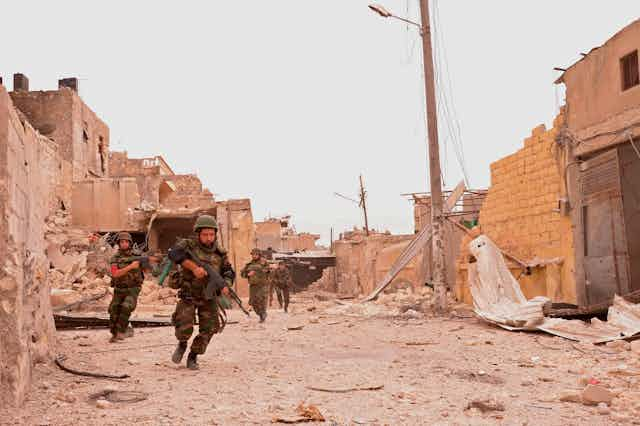On Saturday night, Bashar al-Assad’s regime launched a major offensive to retake control of eastern Aleppo, which various armed factions of the Syrian rebellion have held since 2012.
Aleppo is Syria’s second-largest city, and east Aleppo was the last major civilian centre that the insurgency still controlled. Its takeover is a major strategic and psychological blow for the Syrian opposition.
But while the Assad regime may have captured eastern Aleppo, and will no doubt consolidate control over the rest of Syria’s major population centres, the conflict and its ramifications are far from over.
Won the battle, not yet the war
One reason Assad and his allies may have won the battle for Aleppo but not yet the war is because the neighbouring Idlib governorate remains, relatively firmly, in rebel-controlled hands.
Over the past year or so the two main armed groups operating in the area, Ahrar al-Sham and Jabhat Fateh al-Sham (previously Jabhat al-Nusra), have been consolidating their control of the province.
The groups have done this through the development and delivery of various governance and infrastructure projects. These include maintaining water and electricity supply, sanitation, the sale of subsidised bread, as well as other types of relief provision for an estimated population of more than 1.5 million people.
This is in addition to the many civilian-led local councils that support service and aid delivery in different Idlibi communities.
Even if the regime was to recapture Idlib governorate in what would need to be a brutal military offensive, the people living in many of its towns and cities have experienced, at the very least, an experiment in participatory government after decades of authoritarian control.
Despite the hardship, and many of the failings of the rebels’ attempts at governance, the memory of some level of freedom – unheard of in Syria before the uprising – will be difficult for the regime to erase.
Additionally, after nearly six years of war, Syria’s economy and physical infrastructure lie devastated. The World Bank recently estimated the cost of rebuilding the country may reach US$180 billion.
Many of Syria’s great historic cities – like Aleppo, Hama and Old Homs – are shadows of their former selves as a result of the conflict.
To make matters worse, the Syrian pound has depreciated more than 92% since the start of the war. Its value has fallen from 48 pounds to the US dollar to 625 pounds to the dollar on the black market in May 2016.
The regime’s primary international backers, Iran and Russia, may be willing to assist financially with rebuilding Syria’s physical infrastructure. But it seems unlikely even their coffers will stretch as far as the World Bank’s estimate.
Finally, as the civil war has ground on, the regime has become increasingly reliant on external support. This has come from Lebanese Hezbollah, Iran, Russia and various other notionally pro-regime militia groups. The growing death toll of regime forces and the sheer cost of waging the war has meant the Assad regime has effectively outsourced much of its previous military and security capabilities.
Arguably, even if it eventually “wins” the war against the insurgency, the regime will find it difficult to provide a “legitimate monopoly on violence”. Growing tensions between Iranian and Syrian military personnel have already been reported.
Likewise, the Assad regime exercises very little control over many militias. The armed forces are being eaten away by local militias involved in criminal enterprises and smuggling. The regime’s oft-cited war-cry – “Assad or we burn the country” – may have come to pass in a potentially unexpected way.
So, what now?
Assad recently said that taking Aleppo:
… won’t mean the end of the war in Syria. But it will be a huge step towards this end.
He was right in both regards. The fall of rebel-held Aleppo marks a turning point in the war but it is not yet the end-game. The regime will now attempt to consolidate its rule over the area and population of Syria it controls.
Leaving aside Islamic State, which Syrian Foreign Minister Walid al-Muallem recently claimed was not the government’s “prime concern”, it is only a matter of time before Assad and his allies defeat the vestiges of the Syrian rebellion, now corralled in Idlib. However, economic ruin and the fracturing of the once-almighty security apparatus is the price the regime will pay for its victory.
The legacy of some level of freedom will also be difficult to erase from the minds of millions of Syrians who supported the rebellion.
So, while Aleppo has fallen and Assad may be able to defeat the remaining insurgents militarily in the short-to-medium term, the ramifications of the war are far from over.

